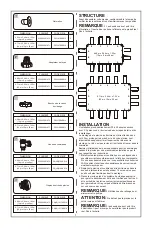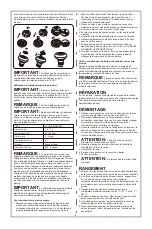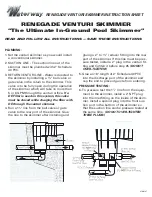
such as a lattice fence, the maximum opening formed
by the diagonal members should be no more than
1-3/4 inches.
8. Access gates to the pool should comply with Section I,
Paragraphs 1 through 7, and should be equipped to
accommodate a locking device. Pedestrian access
gates should open outward, away from the pool, and
should be self-closing and have a self-latching device.
Gates other than pedestrian access gates should have
a self-latching device. Where the release mechanism
of the self-latching device is located less than 54
inches from the bottom of the gate, (a) the release
mechanism should be located on the pool side of the
gate at least 3 inches below the top of the gate and (b)
the gate and barrier should have no opening greater
than 1/2 inch within18 inches of the release
mechanism.
9. Where a wall of a dwelling serves as part of the
barrier, one of the following should apply:
(a) All doors with direct access to the pool through that
wall should be equipped with an alarm which produces
an audible warning when the door and its screen, if
present, are opened. The alarm should sound
continuously for a minimum of 30 seconds within 7
seconds after the door is opened. Alarms should meet
the requirements of UL2017 General-Purpose
Signaling Devices and Systems, Section 77. The
alarm should have a minimum sound pressure rating
of 85 dBA at 10 feet and the sound of the alarm should
be distinctive from other household sounds, such as
smoke alarms, telephones, and door bells. The alarm
should automatically reset under all conditions. The
alarm should be equipped with manual means, such
as touchpads or switches, to temporarily deactivate
the alarm for a single opening of the door from either
direction. Such deactivation should last for no more
than 15 seconds. The deactivation touchpads or
switches should be located at least 54 inches above
the threshold of the door.
(b) The pool should be equipped with a power safety
cover which complies with ASTM F1346-91 listed
below.
(c) Other means of protection, such as self-closing
doors with self-latching devices, are acceptable so
long as the degree of protection afforded is not less
than the protection afforded by (a) or (b) described
above.
10. Where an aboveground pool structure is used as a
barrier or where the barrier is mounted on top of the
pool structure, and the means of access is a ladder or
steps, then (a) the ladder to the pool or steps should
be capable of being secured, locked or removed to
prevent access, or(b) the ladder or steps should be
surrounded by a barrier which meets Section I,
Paragraphs 1 through 9. When the ladder or steps are
secured, locked, or removed,any opening created
should not allow the passage of a 4-inch diameter
sphere.
Section II: Barrier Locations
Barriers should be located so as to prohibit permanent
structures, equipment or similar objects from being used to
climb the barriers.
Only for outdoor use.
Teach your children to swim.
Never dive, jump, or slide into the pool.
Adult supervision is always required.
Parents should learn CPR.
Never swim alone.
Keep all electrical radios, speakers and other appliances
away from the swimming pool.
When you touch the filter, pump, or electrical parts, be
sure the ground under your feet is “Bone Dry.”
All electrical outlets should have a GFCI and connections
should be a minimum of 5 feet (1.52 m) from the outside
perimeter of the wall of the pool. From 5–10 feet
(1.52–3.05 m), there should be either a fixed connection
(outlet box) or twistlock connection with a GFCI.
Connect power cords to a 3-wire grounding-type outlet
only.
Keep all breakable objects out of the pool area.
Alcohol consumption and pool activities do not mix. Never
allow anyone to swim, dive or slide under the influence of
alcohol or drugs.
Severe electrical shock could result if you install your
pump or filter on a deck. The pump or filter could fall into
the water, causing severe shock or electrocution. Do not
install on a deck or other surface at, above, or slightly
below the top rail of the pool.
Do not use the pool during severe weather conditions, i.e.
electrical storms, tornadoes, etc.
Be aware of overhead power lines when vacuuming your
pool or using a telescoping pole.
Do not allow diving, climbing, sitting, or standing on the
top rails of the pools.
Do not allow roughhousing and horseplay.
Do not engage in extended breath holding activities
underwater; you may black out and drown.
Install a pool ladder(s) or staircase for entry and exit from
the pool.
Keep deck clean and clear of objects that may create a
tripping hazard.
Check regularly for signs of wear or loose bolts that could
make the deck unsafe.
Instruct pool users about the proper use of all pool
ladder(s) and staircases.
Face ladder going up or down.
Allow only one person at a time on the ladder.
Check all nuts and bolts regularly to ensure that the ladder
stays sturdy.
Remove or secure the ladder to prevent entry to pool
when not in use.
Please contact pool site dealer or manufacturer for
additional safety signs if deemed necessary.
For pool service, select a certified pool professional.
Any equipment connected to the circulation systems shall
be positioned so as to prevent their being used as a
means of access to the pool by young children.
The installation must comply with the codes of the
authority having jurisdiction and may require permits for
building, plumbing electrical, zoning, etc.
The pool shall be located a minimum distance of 6 ft.
(1.83 m) from any electrical receptacle.
All 125 volt, 15 and 20 ampere receptacles located within
20 ft. (6.0 m) of the pool shall be protected by a ground
fault circuit interrupter (GFCI). The 20 ft. (6 m) distance is
measured via the shortest straight line distance the supply
cord would follow without piercing a floor, wall, ceiling,
doorway, window, or other permanent barrier.
Prior to use of the pool, the installer shall affix all no diving
signs and safety signs in accordance with installation
instructions so they can be easily visible.
A barrier is necessary to provide protection against
potential drowning and near drowning and that barriers are
not a substitute for the constant supervision of children.
A list of emergency telephone numbers shall be posted,
such as the nearest available police, fire, ambulance,
and/or rescue unit. These numbers are to be kept near the
Watch children at all times.
NO DIVING!
You can be permanently injured.
Shallow water.
PREVENT
DROWNING
WARNING
4





































